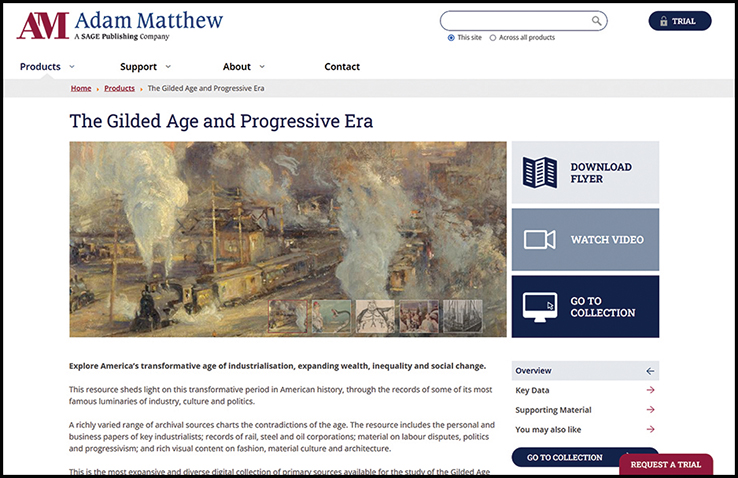The Gilded Age and Progressive Era | Reference eReviews
This database contains thousands of primary documents from 1870 through 1920, sourced from eight archives and libraries (including the Library of Congress, the New-York Historical Society, and Yale’s Beinecke Rare Book & Manuscript Library). It includes personal and business papers of key industrialists; records from rail, steel, and oil corporations; material on labor disputes, politics, and progressivism; and a variety of visuals on fashion, material culture, and architecture; plus calendars, cartoons, diaries, ephemera, essays, personal correspondence, and reports. It is an outstanding resource for general researchers, scholars, and students of late 19th and early 20th-century American history, culture, and society.

The Gilded Age and Progressive Era. Adam Matthew Digital
CONTENT The years between 1870 and 1920 are considered among the most critical and fascinating eras of American history. This database contains thousands of primary documents from this period, sourced from eight archives and libraries (including the Library of Congress, the New-York Historical Society, and Yale’s Beinecke Rare Book & Manuscript Library). It includes personal and business papers of key industrialists; records from rail, steel, and oil corporations; material on labor disputes, politics, and progressivism; and a variety of visuals on fashion, material culture, and architecture; plus calendars, cartoons, diaries, ephemera, essays, personal correspondence, and reports. Documents are organized around 17 themes: architecture; arts and literature; business; charity and philanthropy; family life; industry; international affairs; labor movement; leisure and entertainment; material culture; politics and corruption; poverty and inequality; protests and strikes; reform; society and events; urbanization; and women.
USABILITY The landing page is clean and attractive with colorful images, multiple options for navigation and discovery, a general search box for basic and keyword searches, and a link to advance searches. Just below the search box are tags for exploring the collections: “Introduction” details the nature and scope of the archive, lays out selection criteria for documents, and provides a list of teaching tools; “Browse Documents” enables users to browse all documents at once or browse one of the broad themes; “Visual Resources” is a portal to 15 visual galleries, the American Renaissance Architecture Exhibition, and the Changing Skylines Exhibition; and eight helpful“ Research Tools” show users how to find resources and maximize database features. The advanced search allows searching by keyword, phrase, title, date range, and description, or specifically searching among the 31 document types, 17 themes, and eight archive collections. Text recognition makes it possible to retrieve and search the most relevant handwritten documents, and there’s an option to view documents in high-contrast black and white. Results can be filtered by date, document type, theme, or library archive. Each document has a summary describing its source and the collection. The visual resources (especially the photos and maps) are of outstanding quality. Documents can be downloaded, emailed, and shared via Facebook and Twitter. Several short essays and interviews with scholars are excellent research starting points.
PRICING Costs are determined by factors influencing the number of potential users (e.g., Carnegie Classification; full-time enrollment). Email info@amdigital.co.uk.
VERDICT Adam Matthew is known for providing comprehensive, high-quality, research-focused content that is easy to discover and retrieve. This product is no exception, with a logically organized home page, plentiful and purposeful search options, and a wide scope of documents. It is an outstanding resource for general researchers, scholars, and students of late 19th and early 20th-century American history, culture, and society.
RELATED
ALREADY A SUBSCRIBER? LOG IN
We are currently offering this content for free. Sign up now to activate your personal profile, where you can save articles for future viewing









Add Comment :-
Comment Policy:
Comment should not be empty !!!